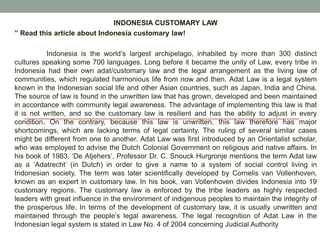indoNEWSian.com – Understanding “Adat”: Indonesia’s Customary Laws and Community Values
Understanding “Adat”: Indonesia’s Customary Laws and Community Values
Indonesia, a sprawling archipelago of over 17,000 islands, is renowned for its breathtaking landscapes and vibrant cultural tapestry. However, beyond the stunning beaches and ancient temples lies a complex and deeply rooted system of customary laws and community values known as “Adat.” Understanding Adat is crucial to comprehending the intricacies of Indonesian society, its diverse cultures, and the interplay between traditional practices and modern legal frameworks.
Adat, derived from the Arabic word for “custom,” encompasses a wide range of unwritten laws, social norms, traditions, and ethical principles that govern the lives of millions of Indonesians. It’s not a monolithic system; rather, it’s a diverse collection of localized customs, each unique to specific ethnic groups and regions across the archipelago. From the Minangkabau’s matrilineal inheritance system in West Sumatra to the Balinese Hindu religious practices that permeate daily life, Adat shapes everything from marriage and land ownership to conflict resolution and environmental stewardship.
The Essence of Adat: Harmony, Balance, and Community
At the core of Adat lies a profound emphasis on harmony (keseimbangan), balance (keselarasan), and community (kebersamaan). These values are deeply ingrained in the Indonesian psyche and influence social interactions, decision-making processes, and the overall approach to life.
-
- Harmony (Keseimbangan): Adat strives to maintain equilibrium in all aspects of life, including the relationship between humans, nature, and the spiritual realm. This harmony is often reflected in rituals, ceremonies, and daily practices designed to appease spirits and ensure the well-being of the community.
- Balance (Keselarasan): This principle emphasizes the importance of aligning individual actions with the needs of the collective. It promotes cooperation, mutual respect, and a sense of responsibility towards others. Decisions are often made through consensus (musyawarah mufakat) to ensure that everyone’s voice is heard and that the final outcome is acceptable to all.
- Community (Kebersamaan): Adat places a strong emphasis on communal solidarity and mutual support. Individuals are seen as integral parts of a larger social fabric, and their actions are expected to contribute to the overall well-being of the community. This sense of belonging fosters a strong social safety net and encourages collective action in times of need.
Key Aspects Governed by Adat:
The scope of Adat is incredibly broad, impacting various aspects of life, including:
- Land Ownership and Resource Management: In many regions, Adat governs land ownership and resource management practices. Customary land rights (hak ulayat) are recognized in some areas, granting communities the right to manage and utilize their ancestral lands according to traditional rules. This often involves sustainable practices designed to protect the environment and ensure the long-term availability of resources.
- Marriage and Family Law: Adat plays a significant role in regulating marriage customs, inheritance patterns, and family relationships. Marriage ceremonies often involve elaborate rituals and traditions that vary widely across different ethnic groups. Inheritance laws can be based on patrilineal, matrilineal, or bilateral systems, depending on the specific Adat of the region.
- Conflict Resolution: Adat provides mechanisms for resolving disputes within communities. Traditional leaders (kepala adat) often play a crucial role in mediating conflicts and finding peaceful resolutions based on customary laws. These methods often prioritize reconciliation and the restoration of harmony over punitive measures.
- Social Hierarchy and Leadership: Adat often defines social hierarchies and leadership structures within communities. Traditional leaders are respected for their wisdom, experience, and knowledge of customary laws. Their authority is often based on consensus and their ability to uphold the values of Adat.
- Arts, Culture, and Rituals: Adat is deeply intertwined with the arts, culture, and rituals of Indonesian communities. Traditional dances, music, crafts, and ceremonies are often rooted in Adat and serve to transmit cultural values and reinforce social bonds.
The Interplay Between Adat and National Law:
While Indonesia operates under a national legal system based on Western principles, Adat continues to exert a significant influence on daily life. The Indonesian Constitution recognizes the existence of customary laws and encourages their integration into the national legal framework, particularly in areas such as land rights and environmental protection.
However, the relationship between Adat and national law is often complex and fraught with challenges. Conflicts can arise when customary laws clash with national regulations, particularly in areas such as land rights, resource management, and women’s rights. The recognition and protection of customary rights remain a contentious issue, with ongoing debates about the extent to which Adat should be incorporated into the national legal system.
Challenges and the Future of Adat:
Despite its enduring influence, Adat faces numerous challenges in the modern era. Globalization, urbanization, and the spread of Western values have eroded traditional practices and weakened the authority of customary leaders in some areas. Furthermore, the encroachment of industries such as mining and logging on customary lands poses a significant threat to the survival of Adat-based communities and their traditional way of life.
However, there is also a growing awareness of the importance of preserving and revitalizing Adat. Many communities are actively working to document and transmit their customary laws and traditions to future generations. Efforts are also underway to strengthen the legal recognition of customary rights and to empower Adat-based communities to manage their resources sustainably.
Conclusion:
Understanding Adat is essential for anyone seeking to comprehend the rich and complex tapestry of Indonesian society. It offers a window into the diverse cultures, values, and traditions that shape the lives of millions of Indonesians. While Adat faces numerous challenges in the modern era, its enduring influence on social norms, legal practices, and environmental stewardship underscores its vital role in shaping the future of Indonesia. By recognizing and respecting the importance of Adat, we can contribute to the preservation of Indonesia’s cultural heritage and support the sustainable development of its diverse communities.
(red)
